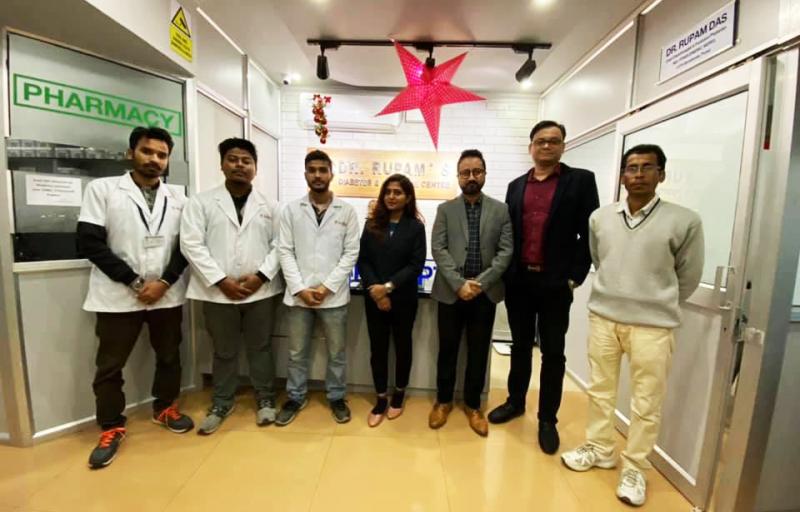Saanvi Health Care And Research Private Limited, is a private company incorporated on 05 October, 2018 located in Kamrup, Assam, India.
The main objective of the company are:

- Providing medical relief to the public in all branches of medical fields specifically in the field of Diabetes mellitus, engaging in medical and clinical research and development of various medical sciences and therapies. Moreover provide, encourage, initiate or promote facilities for the discovery, improvement or development of new methods of diagnostic, understanding and prevention and treatment of disease.
- To act as consultants and advisers providing technical know-how, technical services and allied service for the establishment, operation and improvement of Nursing Homes, Hospitals, Clinics, Medical Institutions, Medical Centres, diagnostic Centres and Laboratories in India and abroad.
Saanvi Health Care And Research Private Limited set up Dr. Rupam's Diabetes & Footcare as a comprehensive setup for treatment of Diabetes and Footcare. Comprehensive diabetes care involves a multifaceted approach to manage the disease effectively and prevent complications. Foot care is critical due to the high risk of infections and amputations in people with diabetes.
Comprehensive Diabetes Care
1. Medical Management
- Regular Monitoring of Blood Glucose: Using glucometers or continuous glucose monitors (CGM).
- HbA1c Testing: Every 3 to 6 months to assess long-term glucose control.
- Medication Adherence: Includes insulin or oral hypoglycemics.
- Blood Pressure Control: Goal often <130/80 mmHg.
- Lipid Management: Statins or other lipid-lowering agents as needed.
2. Lifestyle Management
- Nutrition Counseling: Balanced meals, carbohydrate counting, portion control.
- Physical Activity: At least 150 minutes/week of moderate-intensity aerobic activity.
- Weight Management: Targeted BMI, typically <25 kg/m².
- Smoking Cessation: Strongly encouraged due to vascular risks.
- Alcohol Moderation: Monitor intake and how it affects blood glucose.
3. Education and Self-Management Support
- Diabetes Self-Management Education (DSME): Structured training sessions.
- Psychosocial Support: Managing stress, depression, or diabetes distress.
- Empowerment and Goal Setting: Individualized goals and regular follow-up.
4. Preventive Care and Screening
- Annual Eye Exam: Screen for diabetic retinopathy.
- Renal Function Monitoring: Urine albumin/creatinine ratio, serum creatinine, eGFR.
- Vaccinations: Influenza, hepatitis B, pneumococcal, COVID-19.
Diabetes Foot Care Activities
People with diabetes should have daily foot care routines and annual foot exams by a healthcare professional.
A. Daily Foot Care (Self-Care)
- Inspect Feet Daily: Look for cuts, blisters, redness, swelling, or nail problems.
- Wash Feet Daily: Use warm (not hot) water; dry carefully, especially between toes.
- Moisturize: Use lotion, but avoid between the toes to prevent fungal infections.
- Toenail Care: Cut straight across; file sharp edges.
- Footwear: Wear well-fitting shoes and clean, dry socks (preferably seamless and moisture-wicking).
- Avoid Barefoot Walking: Even indoors.
B. Professional Foot Care Activities
- Annual Comprehensive Foot Exam:
- Inspection: Skin, nails, deformities.
- Sensation Testing: Monofilament, tuning fork, pinprick, temperature.
- Pulses: Dorsalis pedis and posterior tibial arteries.
- Assessment of Footwear: Fit and wear.
- Callus and Corn Removal: Done by trained professionals only.
- Referral to Podiatrist: For patients with foot ulcers, deformities, or high-risk conditions.
- Ulcer Prevention Programs: For high-risk individuals (neuropathy, previous ulcers, foot deformity).
C. Education and Risk Stratification
- Teach Patients Risk Signs: Numbness, tingling, color changes.
- Stratify Patients: Low, moderate, high-risk for foot ulcers/amputation.
The company also takes up community awareness programs for Type 1 Diabetes (T1D). It is crucial to improve public understanding, reduce stigma, promote early diagnosis, and support individuals living with the condition. These programs can be tailored to schools, workplaces, healthcare settings, or the broader public.
Goals
- Educate about the causes, symptoms, and treatment of T1D.
- Promote early diagnosis to prevent diabetic ketoacidosis (DKA).
- Dispel myths (e.g., T1D is caused by diet or lifestyle).
- Support children and families with T1D in schools and communities.
- Encourage inclusive policies in schools, workplaces, and public health.
Core Program Components
1. Public Education Campaigns
- Posters, Flyers, Social Media Content on:
- T1D symptoms: frequent urination, excessive thirst, fatigue, weight loss.
- Difference between Type 1 and Type 2 diabetes.
- Myth-busting videos about insulin, diet, and lifestyle.
- T1D Stories: Testimonials from children, teens, and adults living with T1D.
2. School-Based Programs
- T1D Awareness Days: Interactive sessions during World Diabetes Day (Nov 14).
- Staff Training: Teachers, coaches, and cafeteria staff on managing T1D.
- Student Workshops:
- Understanding insulin pumps/CGMs.
- Supporting classmates with diabetes.
- Emergency Protocol Training: How to recognize and treat hypoglycemia.
3. Health Fairs & Screening Events
- Host community health fairs with:
- Free blood glucose checks.
- Education booths.
- Pediatric endocrinologist Q&A sessions.
- Distribute early warning symptom cards to parents, schools, and clinics.
4. Peer Support & Family Outreach
- Support Groups: Regular meetups for parents, teens, and children.
- Mentorship Programs: Pair newly diagnosed children with peer mentors.
- Parent Workshops: Coping strategies, nutrition planning, insulin management.
5. Partnerships and Advocacy
- Collaborate with:
- Local hospitals, NGOs, and diabetes associations.
- Schools and local groups for local outreach.
- Media outlets to run public service announcements.
- Advocate for:
- Access to insulin and diabetes supplies.
- Inclusive school policies (e.g., designated diabetes care rooms).




